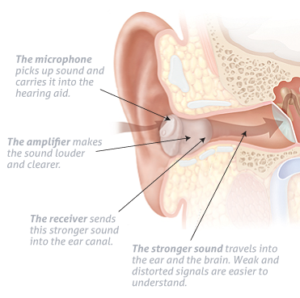Benefits of Hearing Aids
Hearing loss is characterised by an inability to hear certain sounds, especially in noisy environments. Speech can often sound unclear, while other sounds go completely unheard. Many people who have a hearing loss are often reluctant to see an audiologist. There are various reasons for why this issue is so common, such as stigma, people not wanting to accept that they have a hearing loss, or that they do not understand the benefits of hearing aids.
Hearing loss affects people of all ages and in different ways, and is permanent, with a risk of being progressive. The only way you will improve and feel better is by visiting an audiologist where they will test your hearing and find you the appropriate rehabilitative amplification device.
Hearing loss does not just affect your ability to hear, but can have many lasting social and psychological ramifications which will only worsen the longer your hearing loss is left untreated. Initia lly, the effects of an untreated hearing loss will only be noticed socially.
lly, the effects of an untreated hearing loss will only be noticed socially.
Social ramifications include a reduction in socialisation due to the difficulty of it, loss of intimacy with partners, withdrawal, and issues at work due to miscommunication.
However, as you gradually become more withdrawn and have more issues in your relationship and at work, this will begin to take a toll on you psychologically.
The psychological ramifications of an untreated hearing loss include shame or insecurity, anger, low self-confidence, and mental illnesses such as anxiety and depression.
Due to your brain having to work twice as hard to fill in the missing parts of a conversation, you can also suffer physical symptoms such as fatigue and headaches.
Hearing Aids and Medical Benefits
In order to help you make the decision to wear hearing aids, here is a list of just some of the benefits of wearing hearing aids for people suffering with hearing loss:
- Better hearing: while hearing aids do not restore your hearing back to what it used to be, you will be able to hear a lot better compared to without them. Furthermore, you will be able to hear many sounds that you have long since missed.
- Reduce cognitive decline: untreated hearing loss has been attributed to faster cognitive decline, but by maintaining your hearing you will slow this process down.
- Reduce risk of auditory deprivation: if the brain is no longer processing specific frequencies due to an untreated hearing loss, it will eventually lose the ability to. This then makes it harder to get used to hearing aids, as well as a difficulty in recovering normal speech processing when you do decide to get fitted. The sooner you get fitted, the better.
- Reduce the effect of tinnitus: tinnitus is a concomitant symptom of hearing loss, especially due to noise exposure. Many of today’s hearing aids have technology that will help reduce the affects of tinnitus and make your day more comfortable.
- Improved localisation: not being able to perceive where sounds are coming from can be dangerous as you will not know that something is coming closer to you. By wearing hearing aids, your ears will be able to work together to localise sound and sense any danger.
- Improved understanding: consonants are the easiest to miss when you have a hearing loss due to them being high frequency and low energy. Consonants provide clarity to speech, and if you have a high frequency loss, speech may sound flat and mumbled – making it hard to understand. A hearing aid will be able to provide high frequency amplification, and thus restore clarity.
- Better quality of life: by being able to involve yourself in conversations and maintain social relationships, the chance of you feeling isolation due to your hearing loss will be decreased. In addition, your brain will no longer have to work twice as hard to understand speech; reducing fatigue and headaches.
- Better self-confidence: with hearing aids, you will not need to constantly ask for repetitions or worry about incorrectly responding to questions. This will remove the embarrassment you may feel due to your hearing loss. In addition, you will not have to worry about people saying you speak too loud.
- Improving academically and at work: with hearing aids, you will no longer miss out on important information from your teachers, boss, or peers. Therefore, you will not get wrongly accused of misbehaving, or ignoring your responsibilities.

Benefits of Hearing Aids For Children
While there are various issues that can arise from an acquired hearing loss, it is undeniable that an untreated congenital or delayed onset hearing loss in children can be far more problematic.
First and foremost, hearing is extremely important for normal speech and language development. Once they are school-aged, they will struggle even more as classrooms are not optimal listening environments due to their acoustics and overall loud noise. This makes speech easy to miss, and instructions to go unheard.
Children with mild to moderate untreated hearing losses are often misdiagnosed with behavioural problems as they will not follow instructions and be distracting to the class. This can lead to them feeling isolated from their peers as they will not be able to participate in class discussion and they may have feelings of embarrassment towards their hearing loss.
With all of these issues that can arise from an untreated hearing loss, the benefits of hearing aids are incredibly valuable for children with congenital and delayed onset hearing loss.
The hearing aids a child will wear will make sounds louder, especially those where their hearing loss is worse and speech sounds are often the softest, such as high frequency consonants. Wearing hearing aids will allow a child to hear all sounds from birth or onset, meaning that the severity of their language delay will be far less, or even absent compared to children with normal hearing.
Health Cover Benefits for Hearing Aids
Australian Hearing assesses hearing, fits hearing devices, and provides counselling and rehabilitation. If you are an Australian citizen under the age of 26, you are eligible for the government-funded hearing services provided by Australian Hearing. If you are an adult over the age of 26, you may still be eligible if you are a Pensioner Concession Card holder, Department of Veterans’ Affairs Gold or White Repatriation Health Card holder, or a Recipient of a sickness allowance from Centrelink. Hearing Choices works with accredited OHS providers who can provide services under the Office of Hearing Services.
If you are not eligible for subsidies hearing aid through the OHS, unfortunately Medicare does not cover the price of hearing tests, hearing aids, or hearing aid fittings.
However, many private health insurers do offer rebates for hearing aids and appointments.
The only down-side of this is that hearing aids are generally only covered by premium extras covers. It is recommended that you speak with your health insurer in order to see which benefits are available to you.
Hearing aids: commonly partial cover that varies by private health insurers and will have a limit per annum on how much you can get back. Some will also cover bilateral hearing aids. You will also receive replacement hearing aids every 3-5 years depending on your insurance.
Consultations: not always included, but it is partial cover that can be limited per visit, per annum, or only includes the initial consultation. Less commonly, the subsequent consultation can also be partially covered.
Other: not always included but if it is, it will generally be a partial cover for repairs and/or batteries. The cover will either be limited per repair or per annum.
Contact us on 1300 848 335 today for a free, no obligation consultation with one of our qualified consultants.
